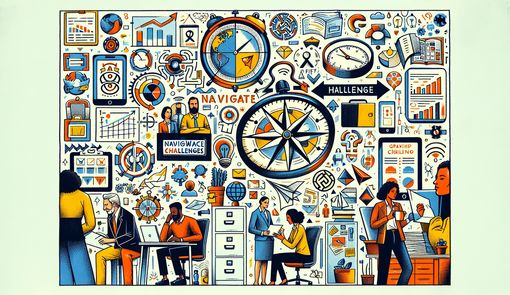The Importance of Project Management Skills in Your Career
Explore how project management skills can significantly enhance your career prospects and success.

Project management skills are among the most valuable assets you can possess in the modern workforce. In a world where businesses thrive on productivity and efficiency, being able to manage projects effectively is crucial not only for project managers but also for professionals across all industries and roles. This set of competencies allows individuals to plan, execute, and finalize projects according to specific deadlines and within budget, which are essential for achieving strategic goals and advancing a career.
Understanding Project Management
Project management is the application of knowledge, skills, tools, and techniques to project activities to meet the project requirements. It involves coordinating human resources, managing tasks, ensuring quality, and mitigating risks. While project management was once primarily associated with construction and engineering disciplines, it has permeated all sectors, from IT and healthcare to marketing and event planning.
Why Project Management Skills Matter
1. Enhances Organizational Skills: Project management requires meticulous planning and organization. By mastering these skills, you can bring a higher level of organization to your work, improving your efficiency and the quality of your output.
2. Improves Time Management: Deadlines are a fundamental aspect of project management. Learning how to manage your time effectively can reduce stress and increase productivity, which is valuable in every career path.
3. Increases Accountability: Managing projects often involves being responsible for a team and deliverables. Developing project management skills helps foster a sense of accountability and integrity, crucial traits for career advancement.
4. Boosts Team Building and Leadership Skills: Effective project management involves leading a team toward a common goal. These skills can help you motivate and direct others, enhancing your capabilities as a leader.
5. Enhances Communication Abilities: Clear communication is vital in project management. The ability to convey ideas, objectives, and feedback clearly and effectively can improve collaborations and outcomes in any role.
6. Encourages Problem-solving: Projects often encounter obstacles that require quick thinking and resolution. By honing project management skills, you become better equipped to tackle complex problems and make informed decisions under pressure.
7. Offers Flexibility and Adaptability: Projects can change scope, and new challenges may arise suddenly. Project management training prepares you for such shifts, making you a more flexible and adaptable professional.
8. Improves Risk Management: Anticipating and mitigating risks is an integral part of managing projects. These skills can be applied to various aspects of your career, from strategic planning to day-to-day operations.
9. Cultivates Resource Management: Balancing human, financial, and material resources efficiently is a critical aspect of project management. Learning to optimize resource use can lead to better management of budgets and personnel in any career.
How to Develop Project Management Skills
1. Formal Education: Many institutions offer courses in project management ranging from certificates to advanced degrees. These programs provide comprehensive training in methodologies like Agile, Scrum, or Waterfall.
2. Work Experience: On-the-job experience is invaluable for developing project management skills. Seek opportunities to lead or participate in projects within your organization.
3. Professional Certifications: Credentials like PMP (Project Management Professional) or CAPM (Certified Associate in Project Management) can demonstrate your commitment and expertise in project management.
4. Learning from Mentors: Engaging with a mentor who has extensive project management experience can provide insights and guidance to grow your skills.
5. Online Resources: There are numerous online platforms offering project management courses, webinars, and tutorials.
Applying Project Management Skills to Your Career
Once you have acquired project management skills, integrating them into your daily work routine can have immediate and long-term benefits. For instance, use these skills to better organize your tasks, manage deadlines, and communicate with stakeholders more effectively. You'll notice an improvement in your performance reviews, project success rates, and might even find that you're better prepared for leadership roles.
Conclusion
Investing in project management skills is one of the smartest decisions for career development. These competencies enable you to manage work more effectively, showcase leadership potential, and adapt to the ever-changing business environment. Whether you’re starting in your career or looking to advance, project management skills are essential for success in any field.
Frequently Asked Questions
1. What are project management skills?
Project management skills encompass a set of competencies that allow individuals to plan, execute, and finalize projects within specific constraints like time and budget. These skills involve coordination, organization, time management, leadership, communication, problem-solving, flexibility, risk management, and resource management.
2. Are project management skills only relevant to project managers?
No, project management skills are valuable for professionals across all industries and roles. While project managers are the primary practitioners, individuals in various positions can benefit from these skills to improve efficiency, productivity, communication, and overall work effectiveness.
3. How can I develop project management skills?
There are several ways to develop project management skills:
- Formal education through courses or degrees in project management.
- Gaining work experience by leading or participating in projects.
- Obtaining professional certifications like PMP or CAPM.
- Learning from experienced mentors in the field.
- Accessing online resources such as courses, webinars, and tutorials.
4. What are the benefits of having project management skills in my career?
Having project management skills can benefit your career in various ways:
- Enhanced organizational skills leading to improved efficiency.
- Better time management resulting in reduced stress and increased productivity.
- Increased accountability and integrity fostering career advancement.
- Improved team building and leadership capabilities.
- Enhanced communication abilities for better collaborations.
- Encouragement of problem-solving and decision-making skills.
- Development of flexibility and adaptability in handling challenges.
- Improved risk management and resource optimization for better outcomes.
5. Can project management skills help in career advancement?
Yes, project management skills are highly sought after by employers as they demonstrate your ability to effectively manage tasks, lead teams, and deliver successful outcomes. These skills can open doors to leadership positions and advance your career across various industries and sectors.
Further Resources
For those interested in further exploring the world of project management and honing their skills, here are some valuable resources to guide you on your journey:
- Project Management Institute (PMI): PMI is a renowned organization that offers certifications, resources, and a wealth of knowledge on project management practices.
- Coursera: Coursera provides online courses from top universities and institutions, including project management courses taught by industry experts.
- ProjectManagement.com: This platform offers articles, webinars, templates, and tools for project managers at all levels.
- Scrum Alliance: If you're interested in Agile project management, Scrum Alliance provides training, certifications, and a global community of Agile practitioners.
- Project Management Books: Explore a curated list of bestselling project management books on Amazon to enhance your understanding and skills.
- LinkedIn Learning: Access a wide range of project management courses on LinkedIn Learning to develop specific skills and stay updated on industry trends.
- Project Management Podcasts: Listen to insightful podcasts on project management hosted by experts and thought leaders for practical tips and strategies.
- Project Management Software Reviews: Compare and choose the right project management software for your needs with in-depth reviews and recommendations on Capterra.
- Association for Project Management (APM): APM offers a range of resources, events, and publications to support professional development in project management.
- Project Management Templates: Discover useful project management templates for Excel and other tools to streamline your project planning and execution.
Explore these resources to deepen your project management knowledge, enhance your skills, and stay ahead in your career endeavors.

 Resume and Cover Letter Writing
Resume and Cover Letter Writing Interview Preparation
Interview Preparation Career Development
Career Development Networking and Personal Branding
Networking and Personal Branding Workplace Skills
Workplace Skills Job Search Strategies
Job Search Strategies Work-Life Balance
Work-Life Balance Salary Negotiation
Salary Negotiation Career Transitions
Career Transitions Navigating Workplace Challenges
Navigating Workplace Challenges Professional Growth
Professional Growth Trends in the Workplace
Trends in the Workplace